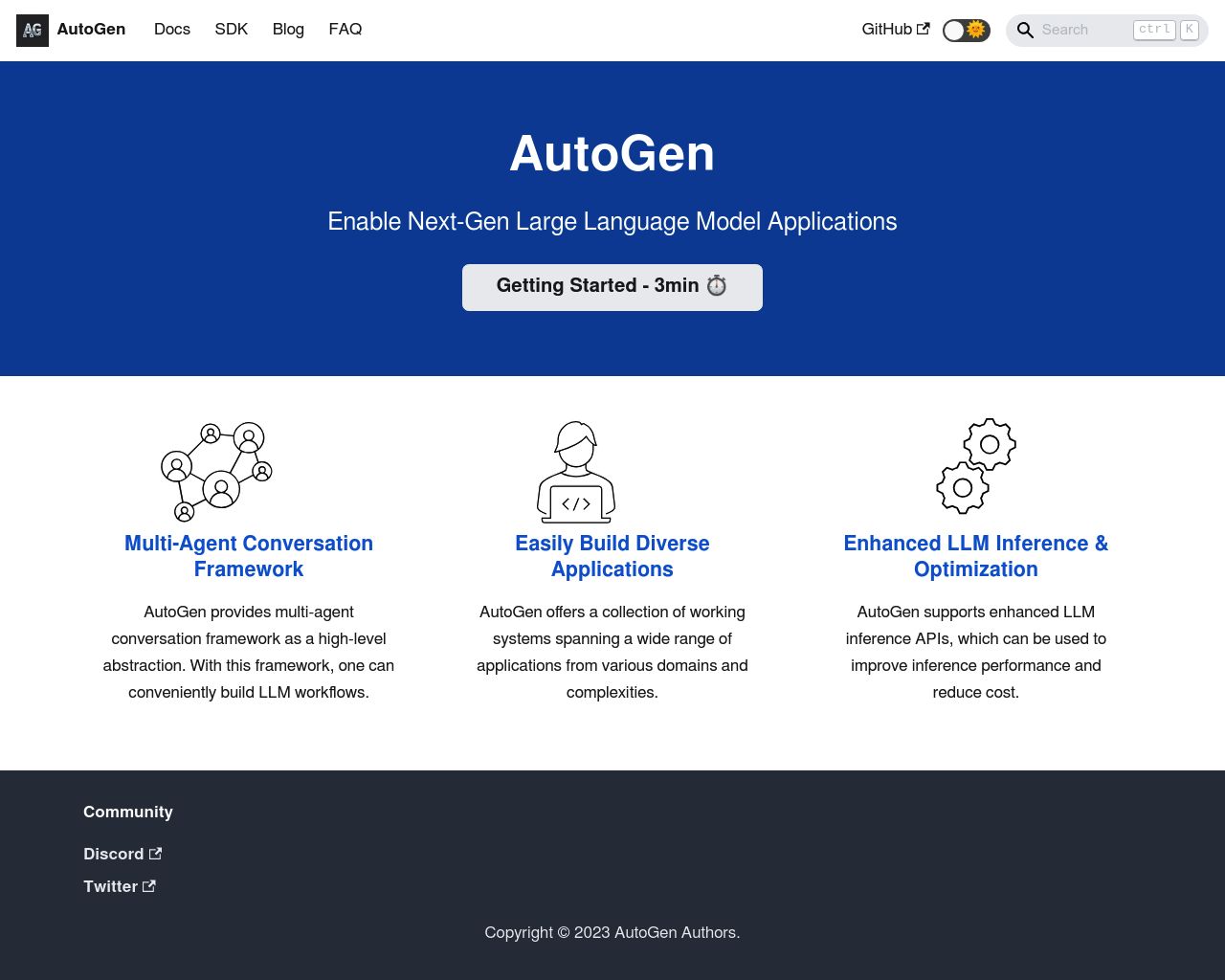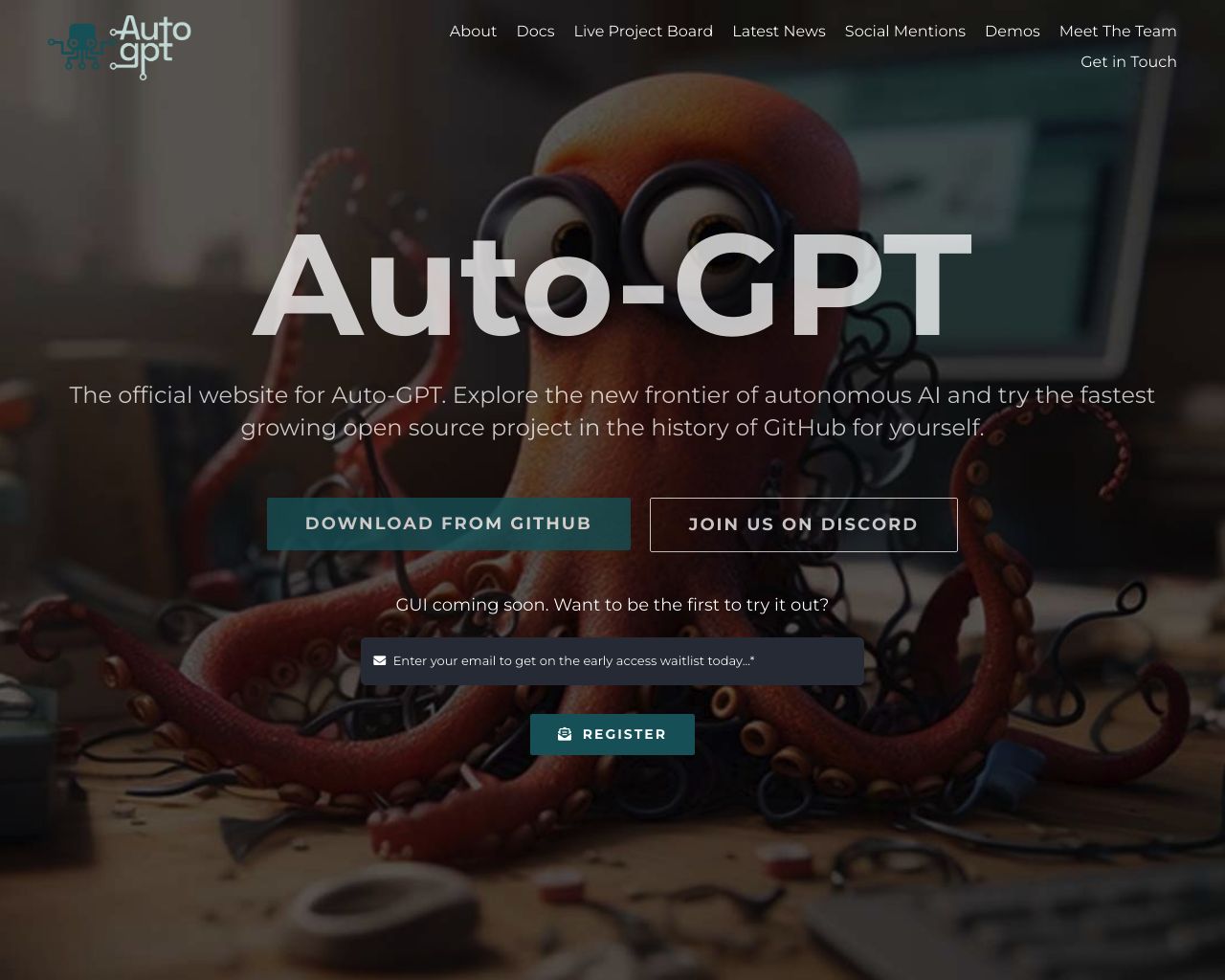AI agent development platforms AutoGen and AutoGPT push the boundaries of autonomous problem-solving, each offering unique approaches to complex tasks. AutoGen excels in orchestrating multi-agent conversations and optimizing LLM performance, while AutoGPT creates fully autonomous agents capable of breaking down intricate problems. This comparison explores their distinct features, strengths, and limitations, revealing how SmythOS emerges as a superior alternative. By addressing key challenges in AI agent development and providing a comprehensive suite of tools, SmythOS caters to both technical and non-technical users, offering unparalleled flexibility, scalability, and enterprise-grade features. Discover how these platforms stack up and why SmythOS stands out as the ideal choice for businesses seeking to harness the full potential of AI agents.
AutoGen Overview
AutoGen empowers developers to create sophisticated AI applications using multi-agent conversations. The framework orchestrates customizable agents that interact with each other, Large Language Models (LLMs), tools, and humans to tackle complex tasks.

AutoGen maximizes LLM performance through enhanced inference capabilities, including tuning, caching, error handling, and templating. This optimization proves crucial for leveraging expensive models like GPT-4 effectively. The platform supports both fully autonomous agent operations and human-in-the-loop problem-solving, providing flexibility for applications where human input is essential.
AutoGen maximizes LLM performance through enhanced inference capabilities… This optimization proves crucial for leveraging expensive models like GPT-4 effectively.
Developers benefit from AutoGen’s debugging tools and logging functionalities for API calls, essential for diagnosing and optimizing LLM-based systems. The framework also includes EcoOptiGen, a cost-effective technique for tuning large language models, highlighting its focus on enhancing LLM efficiency.
AutoGen demonstrates effectiveness across diverse applications, from automated task solving and code generation to continual learning and complex problem-solving in group chats. Its ability to facilitate multi-agent conversations enables collective task performance, making it highly adaptable for various use cases.
While AutoGen offers powerful capabilities, it requires coding knowledge for setup and configuration. The lack of a visual builder or no-code editor may present a steeper learning curve for non-technical users. However, for developers and organizations seeking a flexible, code-based framework for building sophisticated AI applications, AutoGen provides a robust solution that harnesses the full potential of LLMs and multi-agent collaboration.
AutoGPT Overview
AutoGPT revolutionizes AI development by enabling the creation of autonomous agents capable of complex problem-solving. This open-source platform, developed by Toran Bruce Richards and released by Significant Gravitas Ltd., leverages OpenAI’s GPT-4 to create AI agents that can self-prompt, break down tasks, and utilize internet resources to achieve predefined goals.
AutoGPT’s strength lies in its ability to automate workflows by dissecting large tasks into manageable sub-tasks. The platform maintains short-term memory for context and retrieves up-to-date information, making it suitable for a wide range of applications including software development, business operations, and content creation. AutoGPT’s agents can debug and improve their own code, manage files for better data structure, and handle both text and image inputs.
AutoGPT revolutionizes AI development by enabling the creation of autonomous agents capable of complex problem-solving… leverages OpenAI’s GPT-4 to create AI agents that can self-prompt, break down tasks, and utilize internet resources…

Despite its advanced capabilities, AutoGPT faces challenges such as susceptibility to errors from self-feedback, hallucinations, and high operational costs due to its recursive nature. The platform can struggle with infinite loops and lacks long-term memory, which can impact performance in extended tasks.
AutoGPT’s vision aligns with the pursuit of artificial general intelligence (AGI), setting it apart from traditional AI models. Its unique selling point is the autonomous decision-making and task execution capabilities, which have attracted significant attention from the tech community and investors. However, users should be aware of the platform’s limitations and carefully consider their specific needs when evaluating AutoGPT against other AI agent builders.
For developers and AI enthusiasts seeking to push the boundaries of autonomous AI systems, AutoGPT offers a powerful toolkit. Its open-source nature encourages collaboration and innovation, making it an attractive option for those willing to navigate its complexities in pursuit of advanced AI solutions.
Feature Comparison
AutoGen and AutoGPT offer distinct approaches to AI agent development, each with unique strengths and limitations. AutoGen excels in orchestrating multi-agent conversations, maximizing Large Language Model performance through enhanced inference capabilities. Its framework supports both autonomous operations and human-in-the-loop problem-solving, providing flexibility for various applications. AutoGen includes debugging tools and logging functionalities, crucial for optimizing LLM-based systems.
AutoGPT, in contrast, focuses on creating fully autonomous agents capable of breaking down complex tasks and utilizing internet resources independently. It maintains short-term memory for context and can handle both text and image inputs. However, AutoGPT faces challenges with self-feedback errors, hallucinations, and high operational costs due to its recursive nature. Unlike AutoGen, AutoGPT lacks long-term memory and can struggle with extended tasks.
While both platforms aim to push the boundaries of AI capabilities, they differ significantly in their core components and security features. AutoGen provides more robust support for multi-agent collaboration and human-AI interaction, whereas AutoGPT emphasizes complete task autonomy. In terms of security, neither platform explicitly mentions advanced features like constrained alignment or comprehensive data encryption, highlighting potential areas for improvement in both systems.
Feature Comparison Table
| AutoGen | AutoGPT | SmythOS | |
|---|---|---|---|
| CORE FEATURES | |||
| Hosted Agents (Dev, Production) | ✅ | ❌ | ✅ |
| Visual Builder | ❌ | ✅ | ✅ |
| No-Code Options | ❌ | ✅ | ✅ |
| Explainability & Transparency | ✅ | ❌ | ✅ |
| Audit Logs for Analytics | ✅ | ❌ | ✅ |
| Agent Work Scheduler | ❌ | ❌ | ✅ |
| SECURITY | |||
| Constrained Alignment | ❌ | ❌ | ✅ |
| IP Control | ❌ | ❌ | ✅ |
| COMPONENTS | |||
| Data Lakes | ❌ | ❌ | ✅ |
| DEPLOYMENT OPTIONS (EMBODIMENTS) | |||
| Staging Domains | ❌ | ❌ | ✅ |
| Production Domains | ❌ | ❌ | ✅ |
| Deploy as Scheduled Agent | ❌ | ❌ | ✅ |
| DATA LAKE SUPPORT | |||
| Hosted Vector Database | ❌ | ❌ | ✅ |
| Sitemap Crawler | ❌ | ❌ | ✅ |
| YouTube Transcript Crawler | ❌ | ❌ | ✅ |
Best Alternative to AutoGen and AutoGPT
SmythOS stands out as the superior alternative to AutoGen and AutoGPT for agentic AI automation. Our platform empowers users to create and deploy AI agents with unparalleled ease and flexibility. SmythOS’s visual drag-and-drop interface eliminates coding barriers, allowing users of all skill levels to build sophisticated AI workflows rapidly.
SmythOS’s visual drag-and-drop interface eliminates coding barriers, allowing users of all skill levels to build sophisticated AI workflows rapidly.
Unlike AutoGen and AutoGPT, which have limitations in scalability and user-friendliness, SmythOS offers a comprehensive suite of features designed for both individual developers and enterprise teams. Our platform supports a wide range of AI models and integrations, enabling users to leverage cutting-edge technologies without the complexities associated with AutoGen and AutoGPT.
SmythOS excels in providing robust security features, including constrained alignment and IP control, which are absent in both AutoGen and AutoGPT. This makes our platform ideal for businesses requiring stringent data protection and compliance measures. Additionally, SmythOS offers unique capabilities like an Agent Work Scheduler and Logs and Monitoring, providing unparalleled control and visibility over AI agent activities.
SmythOS excels in providing robust security features…absent in both AutoGen and AutoGPT. This makes our platform ideal for businesses requiring stringent data protection and compliance measures.
While AutoGen focuses on multi-agent conversations and AutoGPT aims for autonomous task completion, SmythOS combines the best of both worlds. We offer advanced multi-agent collaboration capabilities alongside powerful autonomous features, all within a user-friendly environment. Our platform’s versatility allows for seamless deployment across various channels, including APIs, webhooks, and scheduled agents — options not readily available with AutoGen or AutoGPT.
By choosing SmythOS, users gain access to a scalable, secure, and feature-rich platform that surpasses the limitations of AutoGen and AutoGPT. Our solution empowers businesses to harness the full potential of AI agents, driving innovation and efficiency across unlimited use cases with unprecedented ease and effectiveness.
Conclusion
AutoGen and AutoGPT offer powerful AI agent development capabilities, each with distinct strengths. AutoGen excels in orchestrating multi-agent conversations and optimizing LLM performance, while AutoGPT focuses on creating fully autonomous agents capable of breaking down complex tasks independently. Both platforms push the boundaries of AI capabilities but face challenges in areas like security features and long-term memory.
SmythOS emerges as the superior choice, addressing limitations found in AutoGen and AutoGPT while offering a comprehensive suite of features. Our platform provides a user-friendly visual builder, extensive API integrations, and robust deployment options. SmythOS supports multi-agent collaboration, human-AI interaction, and advanced security measures like constrained alignment and data encryption.
Unlike AutoGen and AutoGPT, SmythOS caters to both technical and non-technical users with its no-code editor and intuitive interface. We offer unparalleled flexibility in deployment, allowing users to create agents once and deploy them across various platforms and services. This versatility, combined with our focus on scalability and enterprise-grade features, makes SmythOS the ideal choice for businesses seeking to harness the full potential of AI agents.
Experience the future of AI agent development with SmythOS. Explore our diverse range of AI-powered agent templates to jumpstart your projects, or dive into our comprehensive documentation to unlock the full potential of our platform. Ready to transform your workflow? Create a free SmythOS account today and join the AI revolution.